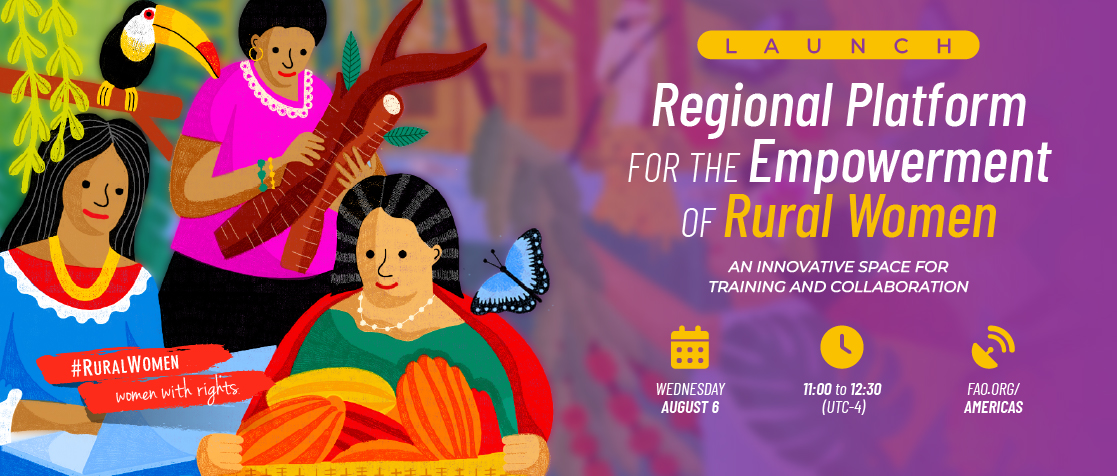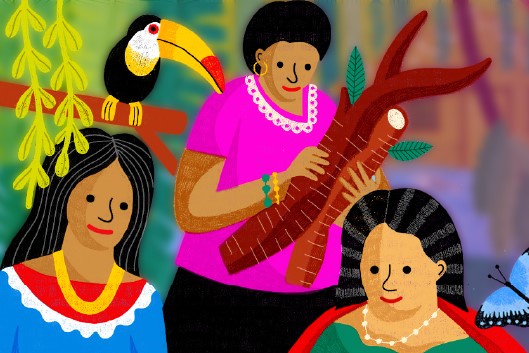Launch of the Regional Platform for the Empowerment of Rural Women A space for training and collaboration
Reducing gender inequalities in food insecurity and malnutrition, access to productive resources, decent working conditions, training, financing, technology.
Virtual Event, 06/08/2025

Live Broadcast
Background
Reducing gender inequalities in food insecurity and malnutrition, access to productive resources, decent working conditions, training, financing, technology, and rural care services in communities is key to advancing the empowerment of women and achieving equitable, sustainable, and resilient agrifood systems in Latin America and the Caribbean.
At the same time, rural, Indigenous, Afro-descendant, and young women play a key role in food security, biodiversity conservation, and climate change resilience in the region. However, they do not enjoy the same access and control over land tenure, productive resources, training, services, technologies, markets, and decent work, and they face an excessive burden of unpaid domestic and care work (REDLAC, FAO, UNDP, 2023).
Additionally, gender inequalities related to land affect the ability of women to exercise their rights to water and irrigation technologies. Currently, women’s participation in water resource management spaces is disproportionately low: only 9% of countries in Latin America and the Caribbean report high levels of female participation in integrated water resource management. This limited inclusion is partly due to the fact that membership in water user associations is often contingent on land or farm ownership (FAO, 2024).
In response to these structural challenges—and to advance gender equality and SDGs 1, 2, and 5—the United Nations has declared 2026 the International Year of Women Farmers. This initiative presents a unique opportunity to take action at the governmental, community, and family levels in support of the empowerment of rural women in all their diversity, and to position their strategic role in biodiversity conservation, food security, and poverty reduction.
Within this framework, and as part of the implementation of the Rural Women’s Empowerment and Environmental Sustainability Acceleration Programme and the regional campaign "Rural Women, Women with Rights," the Food and Agriculture Organization of the United Nations (FAO) has developed the Regional Platform for the Empowerment of Rural Women.
This multilingual digital platform is a pillar of advocacy and commemoration. It is conceived as a strategic tool designed to strengthen the capacities, leadership, and rights of rural, Indigenous, Afro-descendant, and young women in Latin America and the Caribbean.
Designed with a transformative and intersectional gender approach, the platform responds to the need for tools and good practices that promote the development of inclusive public policies. These policies should recognize and enhance the role of women in biodiversity conservation, ecosystem restoration, climate action, and agrifood systems transformation.
The initiative will serve as a virtual space for knowledge exchange and training, promoting access to educational resources, good practices, and strategic and innovative content to foster the economic, political, and social empowerment of rural women.
Its design includes functionalities for multi-stakeholder collaboration and the active participation of diverse rural women in decision-making, with special emphasis on their visibility, leadership, and resilience.
Objective of the Event
To present the Regional Platform for the Empowerment of Rural Women, highlighting its purpose, functionalities, and potential as a strategic tool to support inclusive public policies and regional cooperation for the empowerment of rural women and environmental sustainability.
Methodology
The event will be held virtually and livestreamed via the website of FAO’s Regional Office for Latin America and the Caribbean. The session will include an institutional welcome, a narrated video introducing the platform, first-hand testimonies, and a regional discussion panel.
Simultaneous interpretation from Spanish to English will be provided.

